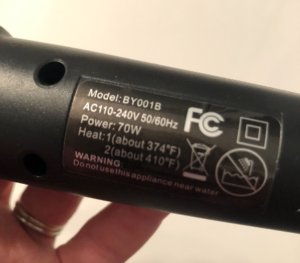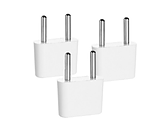Back to: France Training
Security
- If you don’t have a key code on your phone, set one up
Adapters vs. Converters
- Did you know different countries have different outlets?
- Adaptor: changes the plug shape
- Converter: changes the plug shape and converts the volts as well
- America supplies electricity at about 110 volts AC
- Most other countries usually supply electric power between 220 and 240 volts AC
- So if you have an American appliance built for only 110 V, you’ll need a CONVERTER
- If your appliance can handle anything between 110 and 240 V, all you need is an ADAPTER
- You can find converters and adapters linked on our shop page (or on Amazon, at Target, or other similar stores).
So what do you need?
- Check your appliance before you go
- Common appliances (like phone chargers and laptop chargers) usually only need an adapter
- Look for V or voltage on your appliance
- If it says Voltage: 110 – 240V, all you need is an adapter
- If it says Voltage: 110V, you need a converter
 |  |  |
| This appliance only needs an adapter | Adapter (U.S. to Europe) | Converter (U.S. to Europe) |
Cell phone coverage: International plan vs. SIM card
- You need to choose one of these so you can make calls in case of emergency
- Usually, it’s simpler and cheaper to get a SIM card for phone service abroad
- Some plans have affordable international service
- For example, T-mobile has international coverage — however, bear in mind that the data is usually very slow (which isn’t fun when you’re out and about)
- Our recommendation: SIM card with data
How to get a SIM card?
- Before you go, your phone needs to be unlocked
- Call or visit your cell phone provider before you go and see if your specific phone is unlocked
- If it is already unlocked, great!
- If it’s not unlocked, ask them to unlock it for you
- If you can’t unlock your phone for some reason, you can buy an unlocked phone (around $40 for a basic one) or an inexpensive mobile phone that already has a SIM card (as little as $20) once you get there
- After you arrive, ask your host family where you can buy a SIM card (or some host families provide one)
- SIM cards are sold all over the place
- You’ll probably need to show some form of ID (usually a copy of your passport will work fine)
- Cost in Europe:
-
-
- Basic SIM – about $5-10 (usually includes some prepaid calling credit)
- With data – about $15-30 for SIM + some data (varies on data amount)
-
- Have the clerk set it up and do a test call to make sure everything is working the way it should
- When you run out of data/minutes, you can buy more online
- Save important contacts
- When you do this, save them to your phone rather than the SIM card
- Otherwise, you’ll lose access to them when you switch SIMs
- Also, be sure to include the plus sign and country code so your calls will go through
Suggested apps before you leave and during your stay
-
- Practice your Italian and learn basic phrases before you go!
-
- Tons of free, super helpful and fun walking tours
- Download the tours while you have WiFi, then listen when you’re out and about
- Listen to relevant topics before you go to a place and it can really help you make the most of your trip
-
- This is sooo helpful when you’re trying to communicate!
-
- In our opinion, it’s the best way to book accommodations for traveling on the weekend — you can read more details in this section
-
- If you’re trying to save money or can’t find a good train time, FlixBus has affordable buses
-
- Really helpful for finding routes, reading reviews, and exploring by foot
-
- We love this app for figuring out how to get from A to B. Book directly with the mode of transportation you choose, but it’s helpful to see all the options.
Apps for booking trains
Be where you are: A word about phones!
- It’s great to have connection with your friends and family back home
- It’s just as important to “be where you are”
- The main reason you’re there is so that you can interact with the kids and help them
- Make it a goal to truly focus on the children when you’re with them
- Your host parents are the only people you should text/call while you’re “on duty”
- Leave your phone in your room (or in a bag when you’re out) while you’re “on duty” OR turn your phone to airplane mode while you are “on duty”
- If you need to, turn off certain app notifications while you’re “on duty”
